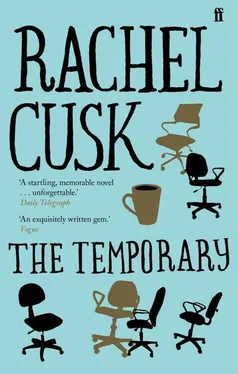Rachel Cusk - The Temporary
Здесь есть возможность читать онлайн «Rachel Cusk - The Temporary» весь текст электронной книги совершенно бесплатно (целиком полную версию без сокращений). В некоторых случаях можно слушать аудио, скачать через торрент в формате fb2 и присутствует краткое содержание. Год выпуска: 2013, Издательство: Faber & Faber, Жанр: Современная проза, на английском языке. Описание произведения, (предисловие) а так же отзывы посетителей доступны на портале библиотеки ЛибКат.
- Название:The Temporary
- Автор:
- Издательство:Faber & Faber
- Жанр:
- Год:2013
- ISBN:нет данных
- Рейтинг книги:5 / 5. Голосов: 1
-
Избранное:Добавить в избранное
- Отзывы:
-
Ваша оценка:
- 100
- 1
- 2
- 3
- 4
- 5
The Temporary: краткое содержание, описание и аннотация
Предлагаем к чтению аннотацию, описание, краткое содержание или предисловие (зависит от того, что написал сам автор книги «The Temporary»). Если вы не нашли необходимую информацию о книге — напишите в комментариях, мы постараемся отыскать её.
The Temporary — читать онлайн бесплатно полную книгу (весь текст) целиком
Ниже представлен текст книги, разбитый по страницам. Система сохранения места последней прочитанной страницы, позволяет с удобством читать онлайн бесплатно книгу «The Temporary», без необходимости каждый раз заново искать на чём Вы остановились. Поставьте закладку, и сможете в любой момент перейти на страницу, на которой закончили чтение.
Интервал:
Закладка:
‘It was all right,’ he said.
‘What did you do, then?’ said Roz after a pause, her hand still clicking on the desk as she spoke.
‘Not much,’ said Ralph. He bent over his work and began writing something.
He occasionally felt guilty about his unkindness to Roz, for she was always interested in him in her slow, impervious way. She would ask him questions with apparently no memory of repetition or rebuff, retaining nevertheless the few blunt details he was obliged to divulge about his activities outside the office and stringing together a little narrative from them of which it pained Ralph to be the subject. He was ashamed of his feelings of physical repulsion for Roz’s pale, doughy form, her big moon of a face with its round eyes and slack, wet mouth. He would find himself watching her occasionally in wonder at her almost impossible plainness and sometimes she would catch him doing it and would reveal her teeth in a mirthless, fleshy smile.
He didn’t know much about her, for her fascination with Ralph’s life seemed to carry within it an almost dutiful apology for the monotony of her own. She lived with her mother in Hendon and she didn’t have a boyfriend. He had asked her about boyfriends when he first started the job, trying to be friendly, but something had lit up in her eyes which told him it had been a stupid thing to ask. The result of his enquiry was the flailing rapport which now plagued him daily, and it was with dumb misery that he realized Roz liked him — and, worse, that she was now irreversibly possessed of the conviction that he liked her — and that no amount of curtness would ever erase his early blunder. He had encountered girls like this before, big, silent girls who required only the acknowledgements his politeness obliged him to offer for their sad, obedient devotion to be forever nourished. At university there were several of them, and they would stop and greet him in the street, standing before him with the mute expectation that he would talk to them, until he had to excuse himself quite rudely and would go on his way with his heart thudding angrily in his chest. He perceived in their attentions some notion of affiliation, a disquieting recognition of his hopelessness which hurt him more than the disdain of loud, confident girls who had made the same discovery.
Roz never asked Neil any questions, although they talked all the time in a way Ralph knew he could not imitate; chatting about things they’d seen on television, or reading a tabloid together while they ate their sandwiches. Neil would ask her how her mum was, what she was seeing at the cinema that night, would even joke about who she was going with, and yet Ralph had never once seen her fix Neil with that dogged, injured look which suggested an outstanding debt awaiting payment. The worst thing was how, on a Monday morning, Roz would unfailingly ask him, with a dull glimmer of painful anticipation in her pale eyes, if he’d met anyone new over the weekend. The question was so audacious to Ralph, and yet bespoke a joyless void of opportunity so horribly familiar to him, that he always answered it awkwardly. His embarrassment made it sound as if he cared that he hadn’t met anyone, and would often inspire Neil to shrieks of effeminate laughter from the other side of the office and a high-pitched rendition of some song about searching which Ralph vaguely recognized.
‘Did you meet anyone new over the weekend, then?’ Roz asked now, her fingers momentarily stayed from their clicking but still poised over the handset as if ready to annihilate Ralph with an electronic pulse.
‘Yes,’ he said suddenly. He heard it fly from his lips and saw Roz jerk slightly, as if the murder of her hopes had been too swift even to feel. Her eyes welled with water and for a moment Ralph wondered in terror if she was going to cry. ‘Yes, I did, actually,’ he continued hurriedly. ‘I’ve got a new girlfriend.’ The words were large and clumsy in his mouth, as if they didn’t fit.
‘What’s this?’ shouted Neil from his desk. ‘Ralph’s got a new bird? You got a bird, mate?’ he said, getting up and coming over.
‘What’s she like, then?’ said Roz.
‘Oh, I don’t know,’ said Ralph. The conversation was unbearable to him. He could scarcely believe he had started it. ‘She’s very pretty.’
‘What’s her name?’ persisted Roz, as if in the hope of finding some ground on which she could conduct a contest.
‘Francine. She’s called Francine.’
‘Fran cine ,’ howled Neil. ‘Fran cine . Not a frog, is she?’
‘I don’t think so,’ said Ralph irritably.
‘Where does she work? What’s her job?’ said Roz.
Ralph looked at her with horror.
‘She’s a secretary,’ he said.
Roz didn’t speak to him for the rest of the day, but the Morse of her clicking informed him that an injustice had been perpetrated against her.
*
Ralph’s indiscretion haunted him that evening at his flat, and although he tried to subdue his memory of it by the devotion of his energies to domestic tasks, the resistance of his surroundings to further regulation so soon after the previous week’s reforms permitted his thoughts to churn and race as he drifted desultorily through a series of minor activities. His slip rose up before him everywhere he looked, monstrous in the familiar, cautious landscape of his communications, and although he knew his customary reticence made a more terrible spectacle of his transgression than perhaps it really was, it seemed ridiculous to try and change the way he saw things merely to diminish it. His preposterous and meaningless untruth appalled him, not because of any fear of it being found out — although the thought of Francine overhearing his conversation with Roz made him grow hot with shame — but more for the burden the very idea had placed upon him, which seemed in his quiet hours to have handcuffed and marched him considerably closer to its fulfilment.
He had telephoned Francine the day after their extraordinary evening, calling secretively from the office in the afternoon when he knew she would still be at work. For him the message had been a polite escape, a gesture to his own sense of how these things should be brought off, nevertheless making it clear, he thought, that their evening had been a pleasant but unique occasion. He supposed everyone had their own set of rules to be applied in such cases, measures long since drawn up by experience to curb the impulses of feeling. He had arrived at his own judgement swiftly, barely able to touch the raw memories which burned in his thoughts as he sat at his desk, but the unavoidable glimpses he had had of their blurred, complex images urged him to parcel up the whole affair and consign it to history. His hangover had been mingled with something darker and more sticky, a strange, guilty sense of himself whose taste he remembered from childhood. He had behaved oddly, had borrowed feelings he had no wish to own, and his desire to forget the episode could not be fulfilled merely through the partial erasure of its worst moments. It had surprised and somewhat irritated him that Francine had called him back late that same night. She had obviously interpreted his message as a statement of infatuation — an impression gained no doubt from its precipitance, the very thing he had thought would inform her of his retreat — and being caught off his guard, his confounded politeness had prompted him to compensate for their silence with the acceptance of another meeting with her during the week. He thought it odd that she could take him for such a fool, and yet still wish to prick him into a semblance of pursuit.
He didn’t exactly regret their evening together, merely the silliness that had gone before it. He had wrought such things in himself, such breathless spirals of hope and despair, for all the world as if he had had nothing better to think about. The ghostly apparitions of wisdom astonished him with their many illusions and tricks, making one quite sure of the existence of something which in the next moment vanished. In the end, though, the discovery that really he was just like every other man filled him with a horrifying form of relief. It was a burden to consider oneself different, and what had he done but for once in his life take something cheaply? And afterwards, what more than feel every man’s mild ache of redundancy, and the desire to move on from what was empty to what was full? For a while, certainly, it had fascinated him to see how little he could care about Francine while sharing with her what he regarded as the most precious and precarious intimacy, but it was no more than a callous experiment with himself which would prove nothing. He had emerged from it belittled, sullied with the memory of what felt afterwards like his own violation.
Читать дальшеИнтервал:
Закладка:
Похожие книги на «The Temporary»
Представляем Вашему вниманию похожие книги на «The Temporary» списком для выбора. Мы отобрали схожую по названию и смыслу литературу в надежде предоставить читателям больше вариантов отыскать новые, интересные, ещё непрочитанные произведения.
Обсуждение, отзывы о книге «The Temporary» и просто собственные мнения читателей. Оставьте ваши комментарии, напишите, что Вы думаете о произведении, его смысле или главных героях. Укажите что конкретно понравилось, а что нет, и почему Вы так считаете.












